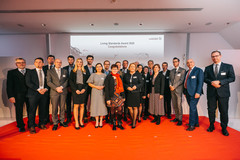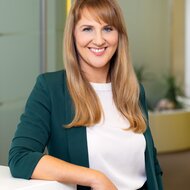Living Standards Award 2020: innovative solutions, ideas and future-oriented technologies with export potential in the limelight

Awards in five categories highlight the importance and the benefits of standards in all spheres of everyday life: from innovative charging technology for smart living to clean groundwater for climate protection and on to the fight against electric waste

Award 2020 ©Philipp Lipiarski
The Living Standards Award is the most significant Austrian prize dedicated to standardization and innovation. It pays tribute to success stories on innovative solutions, ideas and future-oriented technologies with export potential. At the New Year’s reception on 23 January 2020, the Award was presented to the five winners, namely Easelink GmbH, R.U.S.Z GmbH, LOGICDATA Electronic & Software Entwicklungs GmbH, UAS Technikum Wien as well as a project group made up of the University of Natural Resources and Life Sciences, the Federal Ministry for Sustainability and Tourism and Mall GmbH, for their outstanding achievements in the application and development of standards. This event also kicked off the celebrations of the 10th anniversary of Austrian Standards.
It is the objective of the Living Standards Award, which Austrian Standards already presented for the sixth time this year, to raise the visibility of success stories based on the application and development of standards. Up to now, the spotlight has been put on 22 success stories. Around 150 personalities from the fields of business, science and politics attended the Award ceremony held at the Austrian Standards Meeting Center on Thursday evening; one of them was Vienna's Executive City Councillor of Finance, Business, Digital Innovation and International Affairs, Peter Hanke.
Five Award categories illustrate the full spectrum of standardization
"The wealth of knowledge contained in standards gives enterprises a critical advantage supporting the success of their products and services. Additionally, this allows Austria to respond well to global challenges, such as climate protection, digital transformation and artificial intelligence," said Elisabeth Stampfl-Blaha, director of Austrian Standards. In a total of five categories, the Award recognized best practices that provide an insight into the diverse applications of standards:
- "Enabling Solutions": Standards help improve the quality of products and services, implement important interfaces and make production and work processes safer and test and measurement methods more efficient.
- "Reaching International Markets": Standards help roll out Austrian products and services in new markets and, at the same time, ensure their compatibility in international markets. They also support co-operation with international suppliers on site.
- "Developing Future Technologies": Standards are drivers of innovation and a bridge to the market. They help reduce development times, speed up the translation of research results into innovative products and, in general, promote research and innovation processes.
- "IEEE Standards": The IEEE (Institute of Electrical and Electronics Engineers), the largest professional organization of engineers and scientists in the electrotechnical and electronical field worldwide, is a new partner of the Living Standards Award and for the first time awards a prize for the innovative application of IEEE standards.
- "GS1 Standards": It is already for the second time that GS1 Austria co-operates with Austrian Standards to present the Award to a company making supply chains faster, safer and more efficient.
Living Standards Award: Winners 2020
"The examples of our Award winners demonstrate the great benefits that standards have for our modern lives. Standards are created and continuously developed in a dialogue between manufacturers, users, public authorities and researchers. They reflect what makes products and services function in a safe and sophisticated way," Stampfl-Blaha is pleased to note.
CATEGORY "Enabling Solutions": Clean groundwater for climate protection
Abraded rubber particles, mineral oil, heavy metals and other harmful substances end up on Austrian roads and, ultimately, infiltrate groundwater. A project jointly implemented by the Federal Ministry for Sustainability and Tourism (BMNT), University of Natural Resources and Life Sciences (Department of Water, Atmosphere and Environment) and Mall GmbH studied filter materials suitable for groundwater protection and defined limit values. The results were input into ÖNORM B 2506-3 that lays down requirements and test methods for the performance of filter materials in water disposal systems. By ensuring that rainwater runoff is cleaned during infiltration into the subsoil, ÖNORM B 2506-3 makes a valuable contribution to achieving the UN Sustainable Development Goals. The joint project shows how research results can be quickly used in practice through standardization and benefit the economy, society and the environment.
CATEGORY "Reaching International Markets": Fight against electric waste
An important aspect of sustainability and the circular economy is to extend the life of products. The repair and service centre R.U.S.Z located in the 14th district of Vienna is the biggest independent repair shop for electric and electronic equipment in Austria. R.U.S.Z technicians contributed their technical know-how and decades of experiences to the development of specifications for durable and repair-friendly appliances, namely ONR 192102: 2014 (Label of excellence for durable, repair-friendly designed electrical and electronic appliances). CEN/CENELEC JTC 10 used this document as a basis for the European Standard EN 45554 (Energy related products - Material efficiency aspects for ecodesign). Currently, R.U.S.Z forms part of the consortium of the Horizon 2020 project PROMPT that develops independent test methods for consistently assessing the longevity of electrical and electronic appliances before they are put on the market. This is to help prevent the premature obsolescence of appliances. The results will be input into the Ecodesign Directive that will ensure that short-lived electrical appliances will not be offered in the EU from 2025 on.
CATEGORY: "Developing Future Technologies": Charging technology for smart living
In 2019 more than 9,000 new electric cars were registered in Austria and this number continues to rise. With Matrix Charging®, Easelink, a company based in Graz, developed an innovative charging system for e-cars that is made up of two parts: As soon as a car is parked over the charging pad it connects to the Matrix Charging connector installed in the car's underbody. As the charging pads can be installed flush in the parking surface, the technology is suited both for application in public car parks and private home garages. Standards, such as the worldwide safety standard ISO 26262 on the functional safety of electrical/electronic systems in road vehicles, were important basic documents in the development process in order to ensure functionality and safety. Standardized interfaces are needed so that this innovative charging technology can be used for cars of different manufacturers and everywhere. Easelink will significantly contribute to the development of such a standard at the international level.
CATEGORY "IEEE Standards": Home of the future at the Smart Living Lab
For ten years, the University of Applied Sciences Technikum Wien has focused on smart homes and assistive technologies that give elderly people as well as people with special needs a high level of autonomy in everyday life. Since May 2019 the new Smart Living Lab of UAS Technikum Wien has accommodated a complete home including smart home technologies for lighting, heating and air conditioning on more than 250 square meters of effective floor space. There, you can use an eye tracker or tablet to switch on or off the light and open the door. Service robots as well as eHealth technologies have been integrated into the Lab as well. In R&D projects, the Department's staff can perform user tests in the setting of a typical home. Furthermore, new open standards and technologies can be integrated into the home for evaluation.
CATEGORY: "GS1 Standards": How codes contribute to keeping a clear overview
LOGICDATA Electronic & Software Entwicklungs GmbH, headquartered in Deutschlandsberg (Styria), develops smart system solutions for electronically adjustable home and office furniture. As the company is active internationally and has a network of more than 200 suppliers and six production sites worldwide, LOGICDATA relies on GS1 standards in logistics. On exterior packaging, the GS1 DataMatrix is used to encode all the important items of information. Moreover, the final products of the company are marked by a unique identifier (GTIN) as well as a standardized barcode. As all partners along the value chain use the same identification methods and data structure, end-to-end traceability of products, process improvements and stability as well as reproducible quality of services and logistic processes are made possible.
100 years of Austrian Standards: Trust, safety, innovation & diversity
The Living Standards Award ceremony also kicked off the celebrations of the 100th anniversary of Austrian Standards. "Trust, safety, innovation and diversity - these timeless values are our success factors," said Walter Barfuß, president of Austrian Standards. In particular, diversity was a key factor when it came to solve new and complex problems, Barfuß stated and continued: "Manifold economic, technological and social developments as well as different perspectives are brought together at Austrian Standards: More than 4,200 experts representing industry, public administration, research and NGOs work on innovative solutions in an international network."
After the Award presentation, the guests of this year's Living Standards Award were able to see the first exhibits of the anniversary exhibition in a preview. The exhibition was designed in co-operation with Ars Electronica and is to raise the general public's understanding of standards and to allow them to "experience" them in an innovative and forward-looking way. The complete exhibition will be on show at Austrian Standards at Heinestrasse in the second district of Vienna from April 2020 on.



